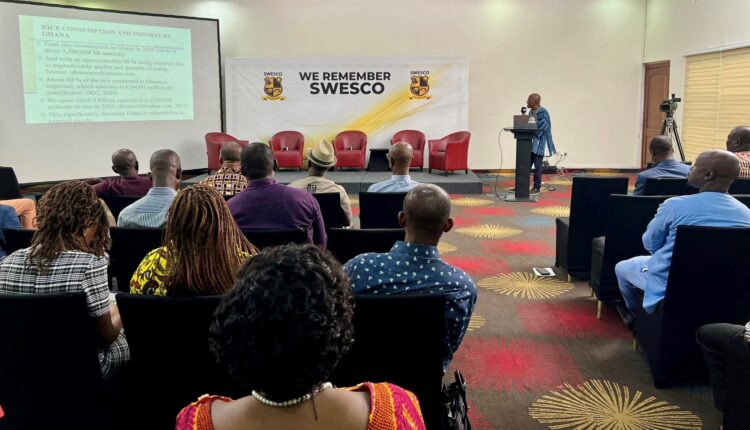Speakers at the Old Swesconians Association annual thought leadership program have urged a rethink of Ghana’s agricultural sector to drive food self-sufficiency.
The event, dubbed ‘The Swedru Conversations,’ brought together industry and academia with the objective of providing practical strategies to make Ghana regain its spot as an agrarian economy.
Organized under the theme, “Feeding Ourselves As A Nation: Perspectives On Revolutionizing Our Agriculture Fortunes,” ‘The Swedru Conversations’ aimed to solicit ideas for bridging the gaps in Ghana’s agric value chain resulting in heavy imports.
The forum was a brainchild of the alumni of Swedru Senior High School (SHS).
Taking inspiration from the school’s motto ‘Semper Cum Optimis,’ which translates as ‘Always With The Best,’ great minds were assembled to lead the conversation. Panelists took turns identifying key areas to reshape agriculture in Ghana, with a special emphasis on how to produce crops and animals to attain food security.
The presentation by the main speaker, Dr. Roger Kanton, an agricultural scientist, revealed why Ghana has not been able to feed itself as a nation decades after independence.
“We can navigate the challenges if only we agree to do so. For example, we are importing onions from Niger, Netherlands, and China when it could be the other way around. Why can’t we feed ourselves as a nation? There are a whole lot of issues. We have large arable lands and water bodies, but they are being under-utilized. There should be inter-ministry and agency collaboration because Ghanaian farmers have the comparative and competitive skills to produce,” he stressed.
Other speakers, all former Swedru SHS students, brought their academic perspectives to bear, providing insights on how subsidized farm inputs, access to credit facilities, duty-free importation of agricultural machinery, innovation, and agric extension should now be central to Ghana’s agricultural production.
“If you go to our agriculture institutions and colleges and look at their infrastructure, they are in a sorry state. We are prepared to invest in equipment for pharmacy and engineering but not agric. We want to do STEM, but agriculture is missing. Our curriculum should be redesigned so that whatever is done in other areas will be applicable in agriculture,” Piesie Prof. Kwame Agyei Frimpong, Associate Professor at the Department of Soil Science, UCC, suggested.
Piesie Dr. Enoch Tham-Agyekum, Lecturer at the Department of Agric Economics, Agribusiness & Extension, KNUST, advised that “subsidies should be given to farmers to use smart technology and other ICT tools.”
“We are not able to feed ourselves because of high inflation and the increasing cost of farm implements and inputs. How then can farmers produce to even break even?” Piesie Prof. Festus Annor-Frimpong, former Head of the Department of Agric Economics, UCC, queried.
The Global President of the Swesco Alumni Association, Piesie Samuel Attah-Mensah, on his part, said ‘The Swedru Conversations’ has come to stay and will continue to be part of the alumni’s yearly activities.
“This is the first of many that we are doing. Every February, we will have the Swedru Conversation to precede the month of March when we have our Speech and Prize Giving Day. This year is our 65th Anniversary, so we are all preparing to be in Swesco to be with the Swesco family.”
The Swedru Old Boys and Girls have indeed set the pace by showcasing a commitment to foster meaningful discussions for national development.
The advocacy by the speakers was the major takeaway, inspiring and motivating policymakers, stakeholders, industry players, and the audience to grow what they eat.


Comments are closed.